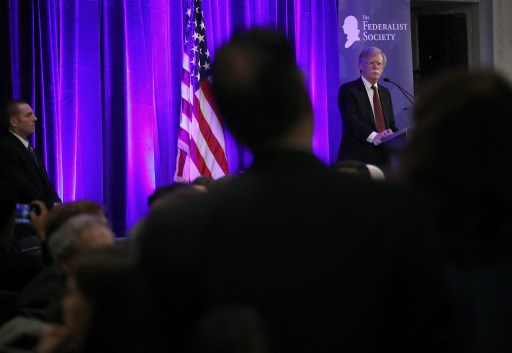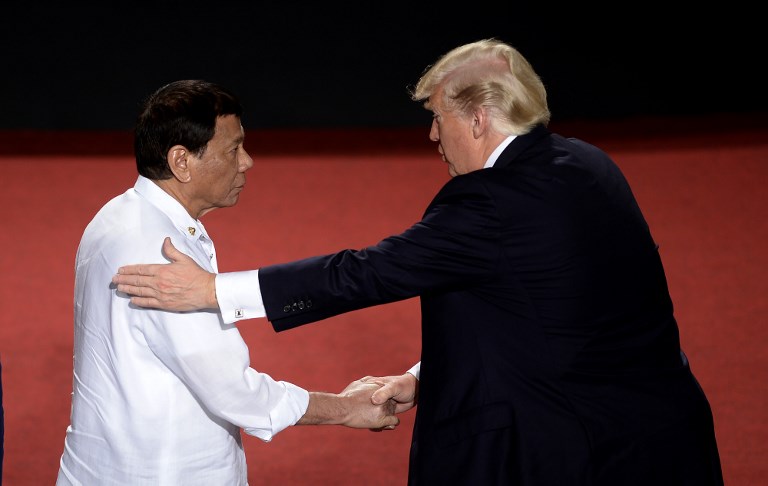
(Eagle News) – It is the not only Philippine president Rodrigo Duterte who is vocal in the opposition and criticism of the International Criminal Court, as the United States on Monday, Sept. 10, issued its strongest criticism and opposition to investigations by the Hague-based international court.
White House National Security Advisor John Bolton called the ICC “outright dangerous” and even threated to ban, prosecute and arrest judges and officials of the ICC who would enter the US to probe alleged war crimes committed by US soldiers in Afghanistan.
He said that the US is even prepared to slap official sanctions against the ICC judges.
Bolton reiterated that US President Donald Trump objected to the idea that the ICC could have a higher authority than the US Constitution and US sovereignty.
“In secular terms, we don’t recognize any higher authority than the US Constitution,” he said.
“This president will not allow American citizens to be prosecuted by foreign bureaucrats, and he will not allow other nations to dictate our means of self-defense.”
“If the court comes after us, Israel or other US allies, we will not sit quietly,” Bolton said.
-Trump’s position against ICC, same as PHL president Duterte’s view-
The US position was the same as the Philippine president’s position against the ICC which is threatening an investigation for alleged crimes against humanity committed by the Duterte administration’s war on drugs.
Philippine president Duterte had also insisted before that the ICC probe against him was against the Philippine Constitution, as he questioned the ICC’s jurisdiction to investigate him and his officials. The Philippines has already sent notice to the Hague-based court of its intent to exit and sever ties with the ICC in March.

World leaders are in the Philippines’ capital for two days of summits. / AFP PHOTO / AFP PHOTO AND POOL / NOEL CELIS
Duterte had even called on other nations to do the same.
“I said withdraw simply because to announce to the world, and I will convince everybody now who [is] under the treaty:
Get out, get out. It is rude,” Duterte said then.
He also threatened to arrest ICC officials who will conduct proceedings against him in the Philippines.
“You can’t exercise any proceedings here without basis. That is illegal and I will arrest you,” he said.
-US threatens financial sanctions vs ICC-
For the US, it is even prepared to go one notch higher as it threatened financial sanctions against the ICC.
Bolton said that the US is also prepared to slap criminal charges against ICC officials if they proceed with any
criminal investigation against any American.
“We will ban its judges and prosecutors from entering the United States. We will sanction their funds in the US financial system, and we will prosecute them in the US criminal system,” Bolton said.
“We will do the same for any company or state that assists an ICC investigation of Americans.”
Bolton also called the Hague-based rights body “unaccountable” and “outright dangerous” to the United States, Israel and other allies, and said any probe of US service members would be “an utterly unfounded, unjustifiable investigation.”
Bolton made the comments in a speech in Washington to the Federalist Society, a powerful association of legal conservatives.
– Investigation into detainee abuse –
Bolton pointed to an ICC prosecutor’s request in November 2017 to open an investigation into alleged war crimes committed by the US military and intelligence officials in Afghanistan, especially over the abuse of detainees.
Neither Afghanistan nor any other government party to the ICC’s Rome Statute has requested an investigation, Bolton said.
He said the ICC could formally open the investigation “any day now.”
He also cited a recent move by Palestinian leaders to have Israeli officials prosecuted at the ICC for human rights violations.
“The United States will use any means necessary to protect our citizens and those of our allies from unjust prosecution by this illegitimate court,” Bolton said.
“We will not cooperate with the ICC. We will provide no assistance to the ICC. We certainly will not join the ICC. We will let the ICC die on its own.”
He also condemned the court’s record since it formally started up in 2002, and argued that most major nations had not joined.
He said it had attained just eight convictions despite spending more than $1.5 billion, and said that had not stemmed atrocities around the world.
“In fact, despite ongoing ICC investigations, atrocities continue to occur in the Democratic Republic of the Congo, Sudan, Libya, Syria, and many other nations.” he added.
The ICC defended itself, noting it has the support of 123 member states and that even the United Nations Security Council has found it valuable, asking it in 2005 to investigate genocide in Darfur, Sudan.
“The ICC, as a judicial institution, acts strictly within the legal framework of the Rome Statute and is committed to the independent and impartial exercise of its mandate,” it said in a statement.
Bolton was strongly criticized by rights groups. Liz Evenson, associate international justice director at Human Rights Watch, said Bolton’s threats “show callous disregard for victims of atrocity crimes.”
“The slaughter of civilians in Syria, Myanmar and elsewhere shows the ICC is needed more than ever to act where it can,” Evenson added.
She said a move to block the complaints against US soldiers in Afghanistan and against Israel would show the US “more concerned with coddling serial rights abusers… than supporting impartial justice.”
In the Philippines’ case, it was Duterte’s critics Senator Antonio Trillanes IV and Magdalo Party-list Rep. Gary Alejano who filed a supplemental communication with the ICC in the Hague pressing it to probe Duterte for his campaign against illegal drugs in June 2017.
The two filed their supplemental communication to support the initial complaint filed against Duterte and 11 other Philippine officials in April 2017 by lawyer Jude Josue Sabio, counsel of self-confessed hitman Edgar Matobato, who had asked the ICC to charge the Philippine officials with mass murder and crimes against humanity for the deaths that have resulted from the administration’s campaign against illegal drugs.
(with a report from Agence France Presse)








